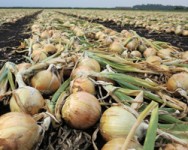Event Details
Date
March 8, 2017
Time
9:30 AM - 4:00 PM
Location
CCE Orleans County
12690 St Rt 31, Curtis Classroom in Education Ctr
Albion, NY 14411
Cost
This event is free.
Host
Cornell Vegetable ProgramChristy Hoepting
585-721-6953
email Christy Hoepting
Onion School and Advisory Meeting (Elba Muck Region)
March 8, 2017
A regional meeting for muck onion growers on the latest research results generated from our 2016 research trials in weed management, bacterial diseases, onion insect management, and onion leaf disease management. We will also be looking for guidance from regional growers on the direction of onion research and programming in New York.
AGENDA:
9:30 am Coffee and Donuts (of course!) and sign up for DEC credits
Muck Onion Weed Management 2016 Research Update -- Christy Hoepting, CCE Cornell Vegetable Program
- PRE-emergent herbicide trial featuring incorporating Chateau, pyroxasulfone, bicyclopyrone into PRE program
- POST-emergent control of ragweed featuring earlier than labeled rates of labeled products, Stinger, Reflex and bicyclopyrone
- POST-emergent control of perennial sowthistle with Stinger including tank mixes, timing between Stinger and Chateau applications and Nortron hold
- POST-emergent control of yellow nutsedge with Chateau, Goal, Reflex and Nortron
- Identify research questions for 2017 trials
Bacterial Disease 2016 Research Update -- Steve Beer, Dept. of Plant Pathology, Cornell University
- Featuring hypochlorite (pool chlorine) statewide on-farm demonstrations
- Direct 2017 research efforts
- Discussion on future of onion maggot control
- Onion thrips insecticide efficacy trial results including early timing of Movento, Exirel as a hammer? Resistance to Radiant and pipeline products
- Relationship between IYSV and onion thrips
- Revising Onion Thrips Management Program for 2017
Onion Leaf Disease Management 2016 Research Update -- Christy Hoepting
- Botrytis Leaf Blight fungicide trial results
- Stemphylium leaf blight fungicide trial results including efficacy of new products, fungicide timing and effect of foliar feeding
- Introducing my new fungicide recommendations for BLB, SLB and DM in 2017
- Identify research questions for 2017 trials
4:00 pm Adjourn and pick up your DEC recertification credits
Cost: FREE! For more information and to RSVP, contact Christy Hoepting.
This meeting will also be offered in Oswego, NY on March 16.



































